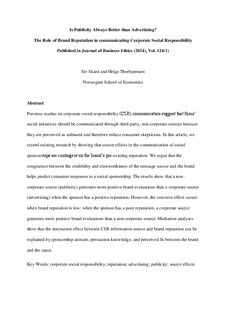Is Publicity Always Better than Advertising? The Role of Brand Reputation in Communicating Corporate Social Responsibility
Journal article, Peer reviewed
Permanent lenke
http://hdl.handle.net/11250/299062Utgivelsesdato
2013Metadata
Vis full innførselSamlinger
- Articles (SOL) [143]
Sammendrag
Previous studies on corporate social responsibility (CSR) communication suggest that firms’ social initiatives should be communicated through third-party, non-corporate sources because they are perceived as unbiased and therefore reduce consumer skepticism. In this article, we extend existing research by showing that source effects in the communication of social sponsorships are contingent on the brand’s pre-existing reputation. We argue that the congruence between the credibility and trustworthiness of the message source and the brand helps predict consumer responses to a social sponsorship. The results show that a non-corporate source (publicity) generates more positive brand evaluations than a corporate source (advertising) when the sponsor has a positive reputation. However, the converse effect occurs when brand reputation is low: when the sponsor has a poor reputation, a corporate source generates more positive brand evaluations than a non-corporate source. Mediation analyses show that the interaction effect between CSR information source and brand reputation can be explained by sponsorship attitude, persuasion knowledge, and perceived fit between the brand and the cause.
Beskrivelse
-This is the author's version of the article:"Is Publicity Always Better than Advertising? The Role of Brand Reputation in Communicating Corporate Social Responsibility", Journal of Business Ethics, September 2014, Volume 124, Issue 1, pp 149-160
